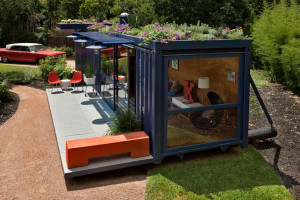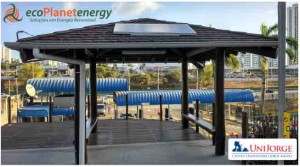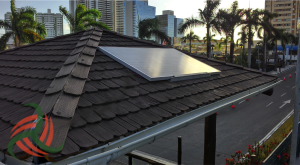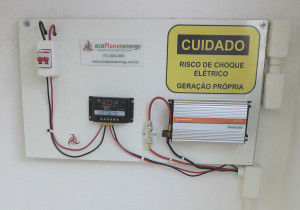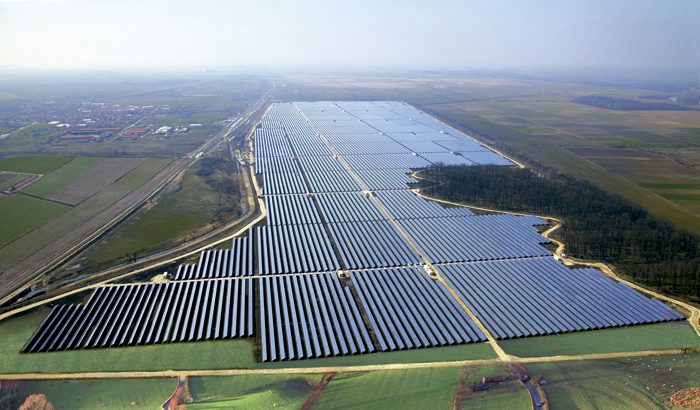Posts Tagged ‘clean energy’
MGM Resorts complete’s U.S. largest rooftoop Solar project

MGM Resorts Beats Toys ‘R’ Us With Biggest Rooftop Solar System
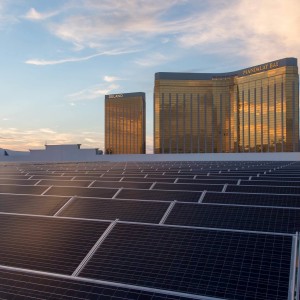 MGM Resorts International surpassed Toys “R” Us Inc. with the largest U.S. rooftop solar installation, an 8.3-megawatt system completed this week.
MGM Resorts International surpassed Toys “R” Us Inc. with the largest U.S. rooftop solar installation, an 8.3-megawatt system completed this week.
With an expansion that included more than 26,000 panels covering 28 acres atop the Mandalay Bay Convention Center, MGM broke the record that the toy seller had heldsince 2011 with a 6.2 megawatt system at a distribution center in Flanders, New Jersey, according to GTM Research. That’s enough energy to power 1,000 average-sized homes for a year.
The project was a partnership between MGM and New Jersey-based NRG Energy, which financed, built and now owns and operates the array. Through a power purchase agreement (PPA), Mandalay Bay will buy the energy generated by the solar array. For MGM, the business and environmental benefits are substantial because the project will provide approximately 25 percent of Mandalay Bay’s electricity needs.
With its ongoing water struggles, the vast amounts of energy and resources going toward recreating cities such as Paris and Venice, and its bawdy reputation as a party town, sustainability is the last topic that comes to mind when thinking about Las Vegas. But Sin City is drenched in sun, and the ample roof space throughout the city offers the local hospitality sector opportunities to reduce costs via solar power and demonstrate it can be a more responsible industry. To that end, MGM Resorts International announced last week it has completed the installation of what it’s calling the world’s largest rooftop solar array on a convention center.
Covering 20 acres on the Mandalay Bay Resort and Casino’s 1.7 million square feet of convention space, over 21,000 solar panels will provide 6.4 megawatts of clean energy to the complex. MGM says the energy generated from the rooftop array is enough to power 1,000 American homes while displacing about 6,300 metric tons of carbon dioxide. The array will also help lower demand on southern Nevada’s electricity grid during the hot summer days.
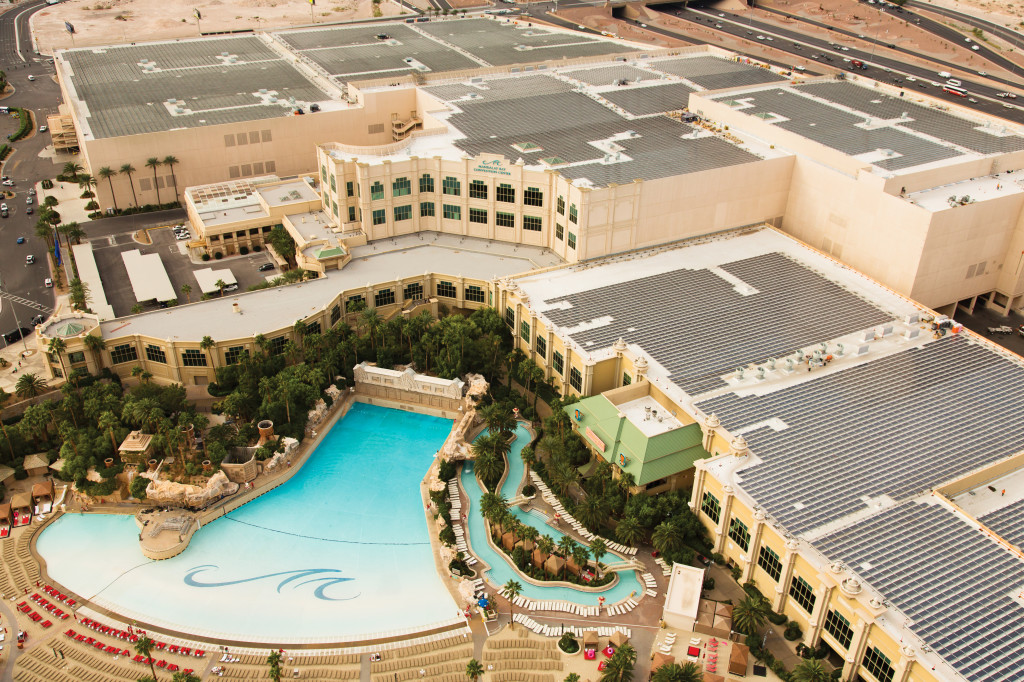
MGM Resorts’ Mandalay Bay Convention Center in Las Vegas is home to one of the largest rooftop solar arrays in the United States – MGM Resorts International
Sources: MGM Resorts International, NRG Energy, Bloomberg.
ECOPLANET promotes renewable energy in university sustainability project

Eco-architecture and Eco-Containers
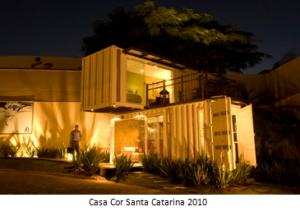
The concept of housing has been changed and increasingly more new ideas come to the fore and become the trend in this market segment. An example is “eco-architecture“. It is increasingly present in buildings, creating cost-effective solutions and new alternatives to live or work in, always focusing on well-being and sustainability of our planet.
Another factor contributing to the creation of new options for housing and work is the overcrowding of cities, coupled with economic factors that makes new concepts to build environments for a greater number of people at a more affordable price.
And this was the thinking that created the idea of showing this concept in practice with offices and ordinary houses, by demonstrating it in the “eco-container“.
EcoPlanet Energy embraced the opportunity to help the University Jorge Amado (Unijorge) in Salvador, Bahia, with its “eco-container” project, aiming to demonstrate sustainability through the use of clean and renewable energy.
EcoPlanet Energy is a popular reference in the renewable energy solutions market in the northeast of the country, and increasingly achieves its mission to popularize the use of renewable energy, when it comes to micro and mini generation of clean and renewable energy in the country. It offers eco-efficient products and high quality services in renewable energy solutions, bringing great savings to its customers by providing efficiency in energy consumption, that also results in positive contributions to the environment.
The sophisticated solutions demonstrated in this eco-container project, follow the lifestyle of today’s modern society: sustainable, solar photovoltaic modules, rainwater collection for reusable water storage and green (garden) roofs, leaving behind the traditional format a house.
The photovoltaic system installed on this eco-container stores its generated energy in a battery which is sufficient to feed all electrical / electronic equipment housed in the container.
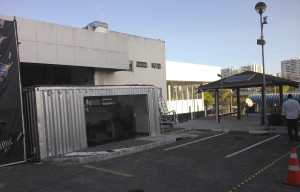 “Another important factor to remember is that the containers that would be otherwise thrown away, can now be reused for the formation of these new home or office concepts, making this prospect an economical, practical and environmentally friendly process,” points out, Ian Ross, the director of EcoPlanet Energy.
“Another important factor to remember is that the containers that would be otherwise thrown away, can now be reused for the formation of these new home or office concepts, making this prospect an economical, practical and environmentally friendly process,” points out, Ian Ross, the director of EcoPlanet Energy.
“We are proud to offer the public a viable alternative option to take control of their energy costs. Our goal is to continue to innovate with the development of renewable energy solutions, always prioritizing the needs of our customers and continue to strive for their complete satisfaction, allowing them to have a better quality of life, and at the same time contributing to the preservation of a more sustainable planet.” concludes the executive.
And you? Would you live in an “eco-container” house or office?
To know more about this project please contact us at: sac@ecoplanetenergy.com ou Tel: (71) 2626.3005.
BRAZIL BUILDS THE LARGEST SOLAR FARM IN LATIN AMERICA

Bahia to receive the largest solar farm in Latin America
Located 800 kilometers from EcoPlanet Energy’s headquarters in the northeast capital of Bahia – Salvador (BA), is Mariquita, the Tabocas district of Brejo Velho, will receive the largest solar power plant ever built in Latin America, with capacity of 254 MW and estimated annual production of 500 GWh. The project was named Ituverava project and is funded by the Italian Enel Green Power company, it is expected to be in operation in 2017.
This will be the largest solar power plant in Latin America, and will help meet the constant demand for electricity in the country – which according to estimates will increase at an average rate of 4% per year by 2020.
Solar energy in Brazil: The increase in energy consumption that Brazil is facing in recent years, is not being accompanied by an increase in power generation from traditional sources present in the country, including hydroelectric, and therefore requires a diversification within their energy grid (matrix). The solution to this problem is represented by photovoltaic plants, which among all renewable energy sources are those that cause the least environmental impact, in addition to the other advantages and benefits that distributed energy generation presents. The auctions held in Brazil by ANEEL (Brazil’s Central Energy Agency) are having a major success.
Source: ABIDES (Brazilian Association for Integration and Sustainable Development)
 English
English 